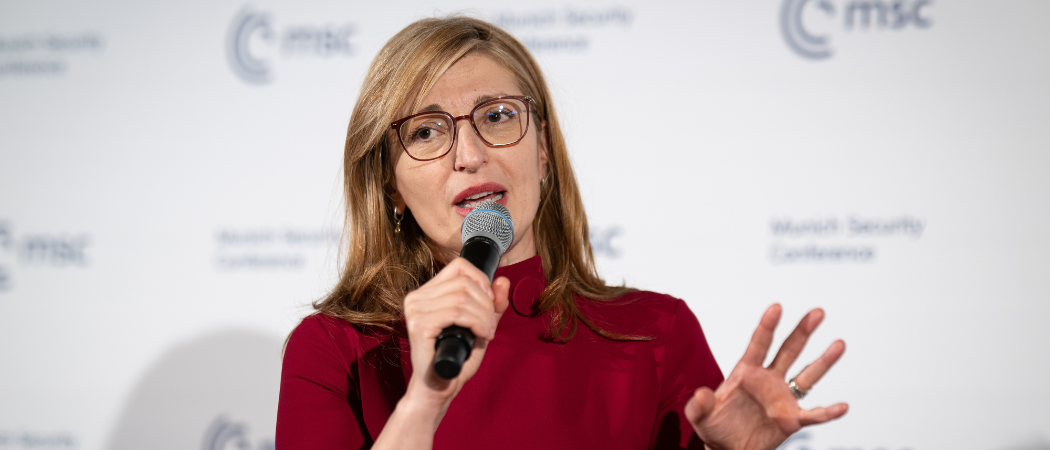Speeches at Munich Security Conference expose a widening transatlantic rift in politics, science and technology

Photo credits: MSC / Preiss
The EU is “really open to work with the US”, research and innovation commissioner Ekaterina Zaharieva told the Munich Security Conference on Friday.
While some research leaders have suggested Donald Trump’s return to the White House could push Europe to look for other partners, Zaharieva suggested the US would remain a key ally. “I really believe that only together can we win this race,” the Bulgarian said during a panel on the global race for tech dominance. “Research and innovation is an excellent sphere where we can work closer, we should work closer.”
But Zaharieva made the comments shortly after US Vice President JD Vance accused European allies of abandoning free speech and claimed the biggest danger to Europe is not Russia or China, but “the threat from within”. Just days earlier, at the AI Action Summit in Paris, Vance also accused Europe of attempting to overregulate artificial intelligence.
Zaharieva acknowledged that the EU and US have differing approaches to regulating technology, but defended EU’s AI legislation which she said will create the trust needed for AI deployment. “We should find a balance between overregulating and zero regulation because this technology can be dangerous,” she said.
The Trump administration’s bullish approach to transatlantic relations also has many in the US concerned. “I don’t think the vice president spoke for the majority of Americans. I don’t think he spoke for the majority of Republican members of congress,” said Democratic senator Mark R. Warner, who was on a panel with Zaharieva.
Warner, who is vice-chair of the senate select committee on intelligence, acknowledged that the Biden administration had also caused confusion by introducing export restrictions on advanced graphics processing unit (GPUs) for AI on most countries, including 17 EU member states, and questioned whether this was the right approach.
“If we make a numerical limitation on GPUs, is that even going to be the chip of tomorrow, as we start thinking about some of the next-generation reasoning chips that may not be GPUs?” Warner said.
“Maybe the metric [should] be less on the numerical number of chips, and more about joint security agreements, government to government, agreeing on who we need to keep out. And I think this is going to be a rethinking process that we ought to be doing in concert with Europe.”
New Cold War
The main focus of the panel was the threat posed by potential Chinese dominance in key technologies such as AI, semiconductors, 5G and 6G. Biotech will also have major security implications, said Warner.
“Just as eight or nine years ago, nobody had heard of Huawei, the next major Chinese entity that people will be talking about a lot is BGI [formerly Beijing Genomics Institute], and frankly, AI combined with bio may have more power than any of the other domains involved,” he warned.
For Mike Gallagher, former chair of the committee on competition with the Chinese Communist Party in the House of Representatives, the race metaphor is inappropriate.
“It’s more accurately a new Cold War. It is global and the stakes are existential,” said Gallagher, now head of defence at Palantir Technologies. He urged policymakers to acknowledge the reality that China has no interest in the rules-based international order, and threatens to control critical technologies and eventually displace the US as “the world’s sole superpower”.
“Technologically, I think we still have a lead, but it is a narrow lead,” he cautioned. “I particularly get concerned when we start to combine China’s advances and investments in artificial intelligence, with the amount of money, men and material they’re throwing at robotics, which is an area we haven’t even begun to really discuss, let alone have a national strategy around, that that’s where we could start to see our edge really erode.”
When asked what losing would look like, Gallagher said China’s goal is to export a model of authoritarian control over technology, noting that the newly released AI model from Chinese firm DeepSeek refuses to answer questions about Taiwan or Tiananmen Square. “We could wake up one day and lose the ability to ask basic questions,” he said.
Due to the current pace of technological change, if China is able to take the lead in a technology like quantum, which has the potential to undermine existing cybersecurity systems, the US will not have time to recover as it did following the launch of Sputnik during the Cold War, Warner said.
Despite ongoing tensions, in December 2024, the US and China renewed an agreement on science and technology cooperation, first signed in 1979, for an additional five years. The updated deal includes new safeguards on researcher security and data reciprocity, and only applies to basic research, not the development of critical technologies like AI and quantum.
Europe has also taken steps to limit collaboration with China on technologies that could be used for military purposes, and Brussels and Beijing are still locked in talks over the future of their science and technology cooperation.





 A unique international forum for public research organisations and companies to connect their external engagement with strategic interests around their R&D system.
A unique international forum for public research organisations and companies to connect their external engagement with strategic interests around their R&D system.